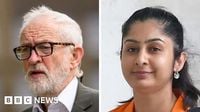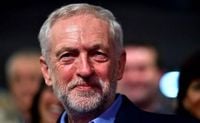Jeremy Corbyn, the former leader of the United Kingdom's Labour Party, has announced the launch of a new left-wing political party, aiming to challenge both his former party and the broader political establishment. The announcement, made on Thursday, July 24, 2025, marks a significant moment in British politics, signaling further fragmentation of the traditional two-party system and the rise of a grassroots movement focused on social justice and wealth redistribution.
Corbyn, 76, and fellow independent Member of Parliament Zarah Sultana, 31, who was suspended from Labour last year for opposing a cap on child benefits, unveiled the new party through a joint statement and a website temporarily named "Your Party." However, both leaders clarified that this is only a placeholder name, with the official name to be decided after wide consultation with supporters. Sultana explicitly stated on social media, "It's not called Your Party!" to clear up early confusion.
The new party is designed to the left of Labour, advocating for a "mass redistribution of wealth and power" and a commitment to a "free and independent Palestine." Their platform includes ambitious policies such as increased taxation on the rich, public ownership of energy, water, rail, and postal services, and an end to arms sales to Israel. The party also emphasizes defending the right to protest against what it describes as genocide, reflecting Corbyn and Sultana's long-standing criticism of Israel's actions in Gaza following the attacks by Hamas militants in October 2023.
In their joint statement, Corbyn and Sultana condemned what they see as a "rigged system" in Britain, highlighting stark inequalities: "The system is rigged when 4.5 million children live in poverty in the sixth-richest country in the world," they wrote. "The system is rigged when giant corporations make a fortune from rising bills. The system is rigged when the government says there is no money for the poor, but billions for war. We cannot accept these injustices, and neither should you."
Corbyn described the new party as "community-led, community-based, grassroots-led," with a "quite federal" structure that balances a core set of values with substantial local autonomy. Speaking to the BBC, he emphasized that the party would be "very different" from Labour, which he criticized as "a very top-down, highly centralized party that is full of control freaks."
The announcement comes amid growing dissatisfaction within Labour under its current leader, Keir Starmer, who succeeded Corbyn in 2020. Starmer's centrist government, elected in July 2024, has faced internal rebellions, particularly over welfare reforms. Earlier in July 2025, more than 120 Labour MPs threatened to derail a welfare spending bill, forcing Starmer to make significant concessions. The prime minister also suspended four Labour backbenchers for defying party discipline, including Sultana, who quit Labour outright earlier this month, citing the party's social welfare cuts and its stance on Israel.
Corbyn himself was suspended from Labour in 2020 after the Equality and Human Rights Commission found that anti-Semitism had been allowed to spread within the party during his leadership. He rejected the findings, calling the anti-Semitism claims "dramatically overstated for political reasons." Despite this, Corbyn was re-elected in July 2024 as an independent MP for Islington North, a seat he has held for over 40 years.
The new party is expected to hold its inaugural conference in autumn 2025, where members will decide on leadership, policies, and organizational structure. Corbyn reported a strong initial response, noting that sign-ups to the party were coming in at a rate of "500 a minute," with Sultana claiming 80,000 supporters had registered within hours of the launch.
Political analysts see Corbyn's new venture as a potential disruptor on the left of British politics. Tim Bale, a professor of politics at Queen Mary University of London, remarked, "Given the difficulties the Labour government has found in both the economy and foreign affairs, you can see why people on the left are frustrated. This party could be very viable." The party's emergence reflects a broader trend toward a multi-party system in the UK, where the Liberal Democrats, the Green Party, and the right-wing Reform UK have all made significant electoral gains.
However, the new party also raises concerns among some Labour stalwarts about splitting the left-leaning vote and inadvertently benefiting right-wing parties like Reform UK. Neil Kinnock, Labour leader in the 1980s, warned that Corbyn's comeback could "ultimately assist the parties of the right."
Corbyn's political journey has been marked by highs and lows. His leadership saw Labour achieve a surprising surge in the 2017 general election, winning 40 percent of the vote, though not enough to secure power. The 2019 election was a crushing defeat, prompting his resignation. Yet, his enduring appeal among grassroots supporters and younger voters remains strong, drawing comparisons to figures like U.S. Senator Bernie Sanders.
The new party's platform also includes a strong stance against economic inequality, advocating for public ownership of key industries and standing up to powerful corporations, particularly in the energy sector. Corbyn and Sultana emphasize tackling poverty, housing shortages, and underfunded education, aiming to build a movement rooted in communities, trade unions, and social movements.
On foreign policy, the party's position is notably more critical of Israel than Labour's current leadership, demanding an end to arms sales and supporting Palestinian self-determination. This stance aligns with Corbyn and Sultana's activism and reflects ongoing tensions within the Labour Party over Middle East policy.
As the UK prepares for local elections in May 2026, the new party could make its electoral debut, particularly in urban areas like London, where discontent with mainstream parties is palpable. While the next general election is not expected until 2029, the political landscape is shifting rapidly, and Corbyn's new party could reshape the left-wing dynamic in British politics.
For now, the party remains a work in progress, with its name, policies, and leadership structure to be finalized in the coming months. But the message is clear: Jeremy Corbyn and Zarah Sultana are determined to offer a new political home for those disillusioned with the status quo, promising a bold, grassroots-driven challenge to the established order.


